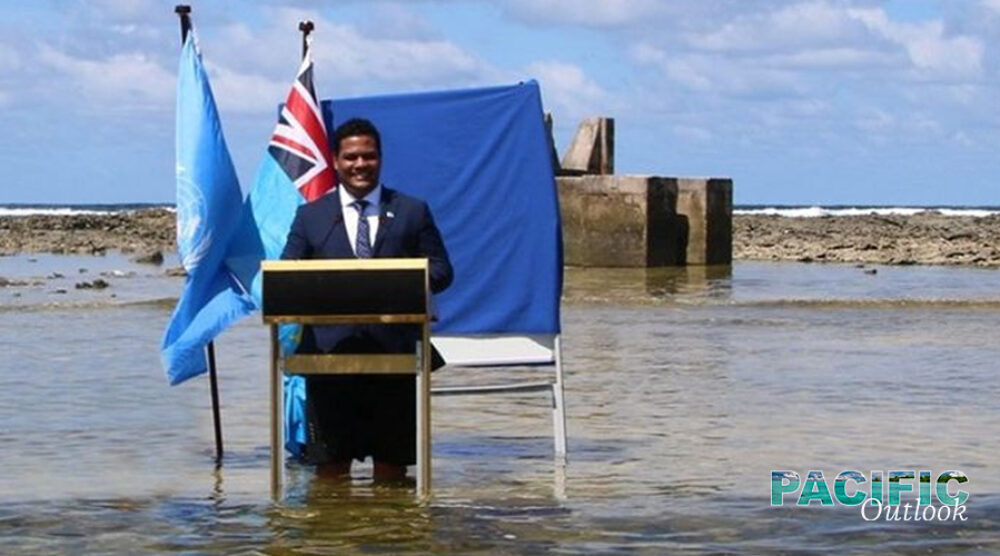TESS NEWTON CAIN AND REBEKAH GENTNER |
With the benefit of a little distance and perspective, we can look back at the Glasgow COP to see how it shaped up for Pacific leaders, negotiators, and activists.
A combination of distance and expense exacerbated by the logistical challenges of navigating COVID-induced restrictions meant that the number of Pacific participants at COP26 was reduced to about one-third of what we have seen previously. Some participated virtually, including via recorded messages. In Pacific capitals, teams worked to support those who were on the ground in Glasgow. This meant working through the night thanks to the time differences. All in all, being part of the Glasgow COP was a huge undertaking for Pacific players.
That said, Pacific participation was once again highlighted in the proceedings. This reflects an ongoing commitment to global leadership from countries such as the Marshall Islands, Fiji, and Vanuatu as well as the Pacific islands region collectively. Pacific voices were heard loud and clear in many of the spaces, both formal and informal. We saw the Prime Minister of Fiji meet with Prince Charles to discuss increased accessibility to climate finance for vulnerable countries. Former US President, Barack Obama, highlighted the centrality of Pacific island countries to what was achieved describing them as the “canary in the coalmine” when it comes to the effects of climate change.
COP26 provided another important insight into what Sala George Carter, Gordon Nanau and Greg Fry have termed ‘Oceanic Diplomacy’. The Pacific contribution to the Glasgow proceedings comprised diplomats, poets, politicians, and faith leaders.
Brianna Fruean is a Samoan climate change advocate. Fruean has been an active voice for Pacific youth on climate change and attended her first conference aged fourteen. Now 23 years old, she continues to advocate worldwide, including at the recent COP26 conference.
Fruean’s contributions during COP26 drew on her Samoan heritage and language. She spoke about the intersection between climate change impacts and gender and highlighted the significance of indigenous sovereignty and knowledge as key components in protecting biodiversity in the face of climate change impacts.
Reverend James Bhagwan addressed the High-level Segment of COP26 on behalf of the Interfaith Liaison Committee. During the speech, he identified the climate emergency as “the result of an ethical, moral and spiritual crisis, manifested in a fixation on profit”
Bhagwan is a prominent leader in the Pacific. He is the general secretary of the Pacific Conference of Churches and has been at the forefront of Pacific civil society activism for many years.
After the conference was over, there were mixed responses from Pacific participants to what had been achieved.
There was a positive response to the fact that the final text of the Glasgow Climate Pact marks a first for the UN-led negotiations with an explicit reference to coal. The importance of oceans was also acknowledged in the text. Members of the High Ambition Coalition fought hard to secure a doubling of adaptation finance. However, large emitting countries resisted calls for a scheme to provide “loss and damage” compensation to those nations adversely affected by a crisis they have not created.
The largest source of disappointment was a last-minute change in wording, from the “phase-out” of coal to its “phase down”.
Reverend Bhagwan said that he was “deeply disappointed” and described COP 26 as having failed. Unsurprisingly, he was particularly critical of the position taken by Australia:
“We are not being listened to by Australia, our closest major polluter and fossil fuel industry promoter? With Pacific island states holding a key place in the Indo-Pacific strategy, we need to seriously consider the true nature of Australia’s relationship with and position in the Pacific vuvale (Fijian word meaning ‘family’) if they are not really honouring the spirit of vuvale and Pacific regionalism.”
There will be little in the way of downtime for Pacific interlocutors as COP27 promises to be another high-octane event, with a continuing focus on countries such as Australia who are yet to announce sufficiently ambitious targets for reducing emissions this decade. With climate shaping up to be a key election issue for Australia in 2022, there is the possibility for some significant shifts between now and then.
Tess Newton Cain is an Adjunct Associate Professor at the Griffith Asia Institute and project lead of the Pacific Hub.
Rebekah Gentner is post-graduate student, currently studying her Masters of International Relations. She is an intern with the Griffith Asia Institute.








